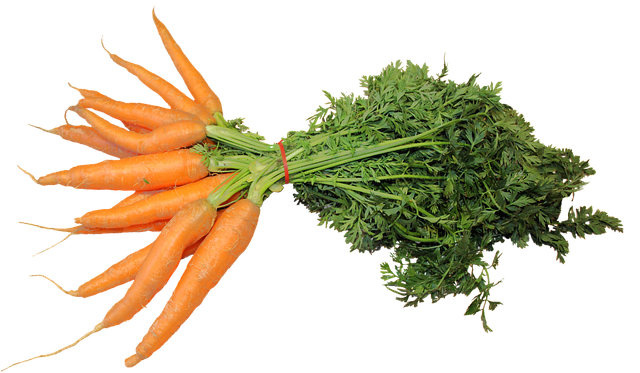What Are Carrots Good For?

The carrot is a vegetable which belongs to the Apiaceae family. It is considered to be one of the most popular and healthiest root vegetables. Carrots are crunchy, tasty, and highly nutritious and have many health benefits due to their vitamin and antioxidant content.
They are found in many colours, including red, orange, yellow, white, and purple. Orange carrots get their bright colour from their beta-carotene content, which is an antioxidant that the body converts into vitamin A. In this article we will look at the many health benefits of carrots.
Nutritional Content
The nutritional content of 1 large carrot (72g), raw is shown in the table below:
| Carrot Nutrition Facts Serving Size: 1 Large Carrot (72g), Raw | |
|---|---|
| Calories | 29.5kcal |
| Protein | 0.6g |
| Sugar | 3.4g |
| Fat | 0.17g |
| Vitamin C | 4.25mg |
| Iron | 0.22mg |
| Magnesium | 8.6g |
| Water | 88% |
| Carbohydrates | 6.9g |
| Fibre | 2g |
| Vitamin A | 601mcg |
| Beta-Carotene | 5970mcg |
| Calcium | 23.8mg |
| Potassium | 230mg |
Carrots are mainly composed of water and carbohydrates and are a relatively good source of fibre. They also contain several vitamins and minerals, including biotin, potassium, and vitamins A, K and B6.
Carrots have a very high vitamin A content which is vital for healthy eyes and vision. They also have high levels of beta-carotene, which is converted by the liver in to vitamin A. Apart from beta-carotene, carrots also contain several other carotenoids such as lutein, cryptoxanthin, lycopene and zeaxanthin. These may help maintain healthy skin and immune function as they protect the DNA, proteins and lipids against oxidative damage from free-radicals and UV light.
Carrots also contain various polyphenols. These add to the anti-inflammatory and antioxidant properties of carrots, helping reduce the risk of cardiovascular disease and cancer.
Health Benefits of Carrots
The health benefits of carrots include the following:
1. May Protect Against Free Radical Damage
Carrots are a great source of many powerful antioxidants, including beta carotene and vitamins A and C. Antioxidants are substances which neutralise free radicals in the body. These are harmful compounds that cause oxidative stress and damage the cells, leading to many chronic diseases such as heart disease and cancer.
Carrots are also a rich source of flavonoids which are polyphenol antioxidants. Studies have shown that diets rich in flavonoids, and the other types of polyphenols found in carrots such as, caffeic, chlorogenic and hydroxybenzoic acid, have several health benefits including a reduced risk of heart disease.
2. May Protect Eye Health
Carrots contain high levels of phytochemicals such as lutein and zeaxanthin, which are thought to protect the eyes from age-related damage, such as macular degeneration, which is the main cause of blindness in the elderly.
In addition to these phytochemicals, carrots also contain vitamins A and C which are essential for eye health. Vitamin A plays a vital role in preventing night blindness. Studies have shown the importance of vitamin A for cataract prevention and so, due to their high beta carotene content (which is converted into vitamin A by the liver), carrots may be beneficial in reducing the risk of developing cataracts.
3. May Protect Against Cancer
Carrots are an excellent source of the carotenoid beta carotene. This powerful antioxidant reduces the risk of some types of stomach and intestinal cancers. To get these benefits one should consume at least 5mg of beta-carotene each day, which equates to one large carrot. Several studies have shown that diets rich in carotenoids (including beta-carotene, anthocyanins, lutein and zeaxanthin) may help protect against several types of cancer, such as prostate, colon, and stomach cancers as well as possibly reducing the risk of breast cancer.
4. May Improve Digestive Health
Carrots have a relatively high dietary fibre content which ensures that the intestines work smoothly. They contain soluble fibre such as pectin which is important for maintaining healthy blood sugar and cholesterol levels. In addition, fibre slows the movement of food through the digestive tract which in turn nourishes the beneficial gut bacteria. A healthy bacterial gut flora is linked to a lower risk of obesity.
5. May protect Cardiovascular Health
Carrots are a rich source of antioxidants such as carotenoids, flavonoids and polyphenols as well as vitamins A and C which protect against the oxidising effects of free-radicals on tissues, proteins and lipids. This reduces the risk of cardiovascular disease.
Flavonoids are one of the most important naturally occurring phytochemicals in fruits and vegetables. Studies have shown that they may help protect against cardiovascular disease. The magnesium and potassium in carrots help to regulate the blood pressure and keep the heart beating steadily. Studies have shown that high intakes of flavonoids can lead to a 20% reduction in the risk of stroke.
6. May Reduce Cholesterol
The soluble fibre pectin and other constituents, such as the antioxidant polyphenols (flavanoids) can reduce the levels of “bad” (LDL) cholesterol, and slow down its oxidation. This further helps reduce the risk of the hardening of arteries, damage to heart muscles and blood vessels.
7. May Help to Control Diabetes
People with diabetes are advised to eat non-starchy vegetables, including carrots. The fibre in carrots can help keep blood sugar levels under control. Carrots are loaded with vitamin A and beta-carotene and there is evidence to suggest that they can lower the risk of diabetes.
Carrots are a low-calorie, high-fibre food that is relatively low in sugar. For this reason, carrots have a low glycemic index (GI). This index helps people with diabetes understand which foods are likely to raise their blood sugar levels and so eating low-glycemic foods is considered very beneficial for diabetics. Boiled carrots have a lower GI score than raw carrots. This means that they are unlikely to cause a blood sugar spike and are safe for diabetics to eat.
8. May Improve Skin Health
Environmental factors, such as the sun and pollution are the principle causes of wrinkles and skin damage. The powerful antioxidants found in carrots may protect the skin from oxidative damage.
Vitamins A, C and E are vital for skin health but vitamin C especially protects against UV damage and environmental pollutants by neutralising free radicals. In addition, vitamin C is necessary for the formation of collagen, which gives the skin strength and elasticity. A diet rich in vitamin C can both help the skin heal from UV damage and also protect the skin in order to prevent wrinkles.
Carrot seed oil and carrot oil contain high levels of Vitamin A and beta-carotene and have been used in many skincare products to maintain the elasticity of the skin and to protect sun damaged and wrinkled skin. They keep the skin firm and radiant due to their anti-aging properties. The antioxidants in carrots reduce and prevent skin damage caused by ultra violet rays. By protecting the skin from UV light it also protects the skin from skin cancer. Carrot oil can also be applied to the skin to treat dry skin problems and it rejuvenates the basal layer. In fact, applying carrot juice to blemishes regularly helps them to fade away.
Summary
Carrots are the perfect snack; crunchy, full of nutrients, low in calories, and deliciously sweet. They may improve cardiovascular and eye health, improve digestion, reduce the risk of certain cancers and make the skin look healthier and more radiant.
